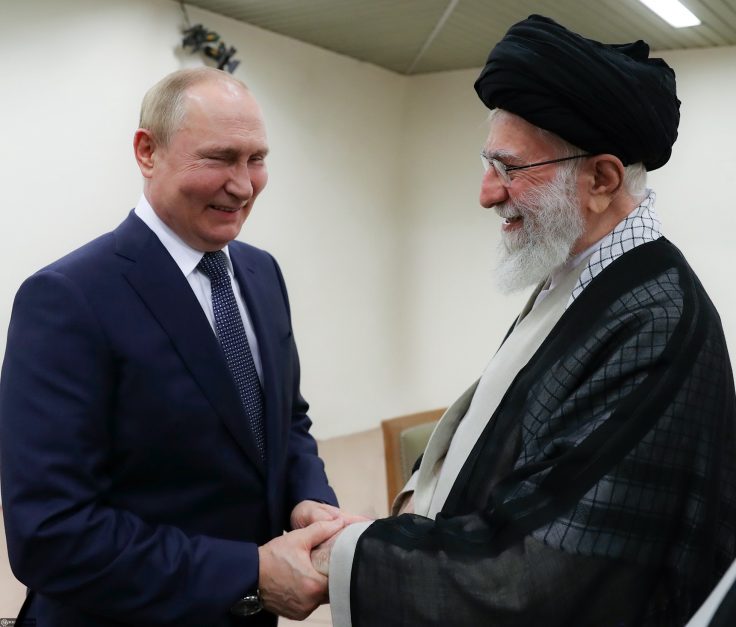The European parties to the Iran nuclear deal are unlikely to reimpose international sanctions on Tehran, paving the way for the hardline regime to send weapons to Russia.
France, Germany, and the United Kingdom are signaling that they will not move to reinstate the sanctions on Iran that were lifted under the 2015 nuclear deal, the Jerusalem Post reported Wednesday. Without these sanctions, a United Nations arms embargo on Iran will expire in October, possibly paving the way for Iran to legally transfer weapons to Russia, which could use Iranian drones and arms in its war on Ukraine.
The European trio’s move comes as the Biden administration is engaged in secret diplomacy with Tehran to secure a revamped nuclear deal. By not reimposing sanctions, the White House and its foreign allies are poised to secure an interim deal with Iran that will lift sanctions in return for minimal nuclear restrictions. These concessions undercut the allies’ efforts to rebuff Russia’s aggression towards Ukraine, experts say.
"The U.S. and Europe had a choice to make: Kyiv or Tehran. It appears they've chosen Tehran," Richard Goldberg, former director for Countering Iranian Weapons of Mass Destruction at the White House National Security Council, told the Washington Free Beacon. "There is nothing left of the [Iran deal] and yet there's an unwillingness to trigger the snapback and take away all of Iran's strategic benefits under deal."
Any nation that signed onto the Iran nuclear deal has the power to trigger the deal’s "snapback" provision, which would reimpose the pre-2015 sanctions on Tehran. The provision was meant to ensure that Iran did not violate the provisions of the deal. Triggering the snapback sanctions does not require approval from the United Nations Security Council, making it safe from a Russian veto.
Iran has repeatedly violated the nuclear agreement, most notably the restriction on how much enriched uranium it can produce. Tehran is currently enriching nuclear materials to above 60 percent purity, just shy of the amount needed to power an atomic bomb. Iran has also violated an arms embargo by sending weapons to regional terror groups, as well as Russia, one of its top allies.
The Biden administration and its European allies have been using the arms embargo as justification for their sanctions on Iran’s drone industry, which is feeding Russia’s war in Ukraine. If the arms embargo expires, the West will lose this leverage while also legalizing these sales.
"Every attack on Ukraine using an Iranian drone will be a reminder of American and European fecklessness," said Goldberg, who currently serves as a senior adviser at the Foundation for Defense of Democracies.
The Biden administration has waived sanctions so that Iraq can pay Iran up to $10 billion in back payments for electricity purchases. This money will serve as a critical lifeline to the cash-strapped Iranian regime as it attempts to quash democratic protests.
The United States has also granted sanctions waivers that allow Iran to work with Russia on a range of nuclear issues, including the construction of reactors. This work has provided billions of dollars to Russia, even as the United States uses sanctions to try and restrict Moscow’s funding for the war in Ukraine.
The arms embargo’s expiration would also throw a wrench in congressional efforts to sanction the Iran-Russia military pipeline.
The Biden administration’s budding agreement with Iran would allow it to produce "up to eight nuclear weapons in three months," the Free Beacon reported last week, a move that would put Iran "closer to the nuclear threshold" than ever before.
A State Department spokesman would not outline the administration's position on sanctions snapback, but said diplomats "have long made clear our concerns about Iran’s nuclear, missile, and conventional arms-related activities, and associated procurement efforts." The U.S. continues to work closely with European allies and the U.N. to "impede these activities," according to the spokesman, who noted that "Iran’s development and proliferation of ballistic missiles pose a serious threat to regional and international security."
